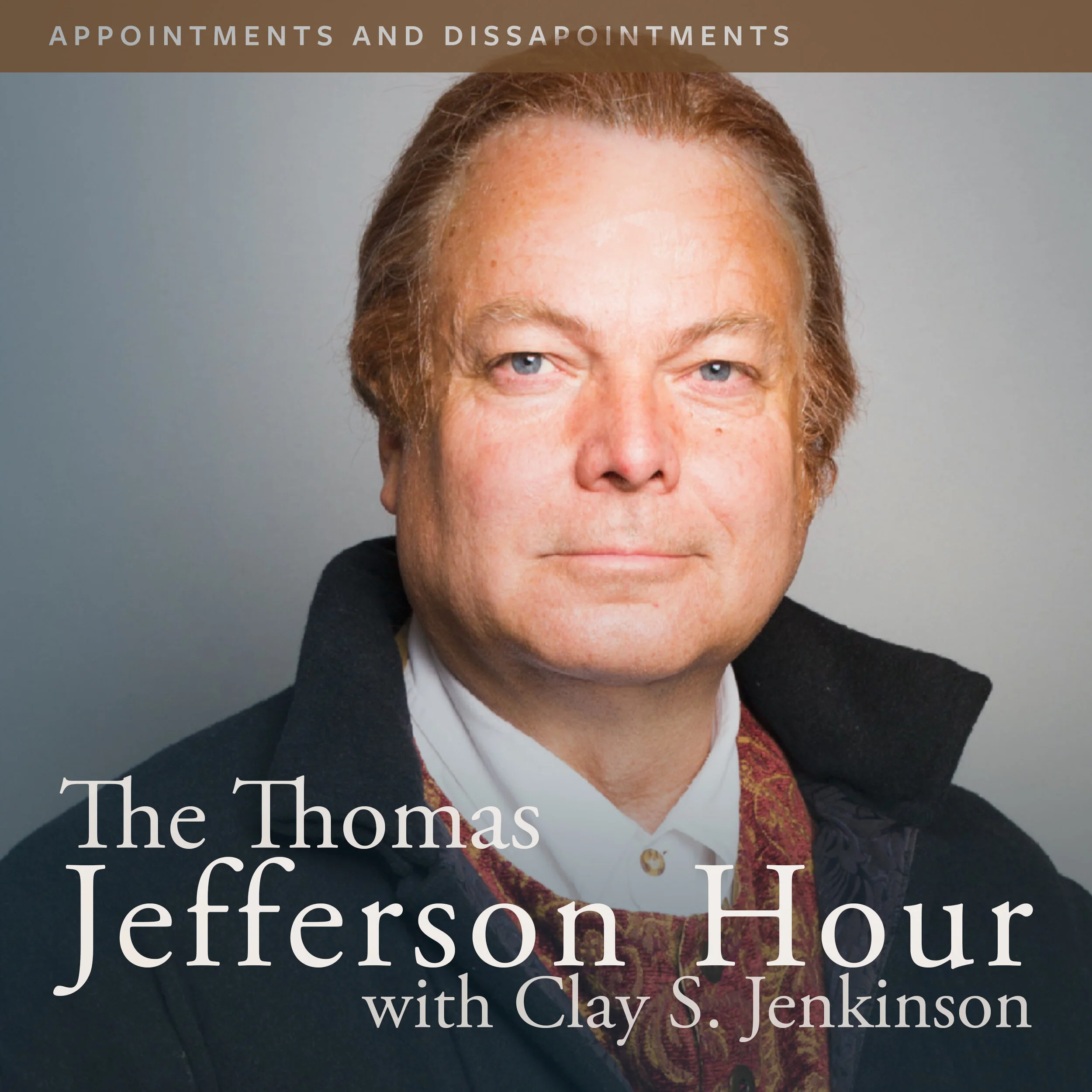We're pleased to welcome back the noted author and historian Lindsay M. Chervinsky. She and Clay discuss how Washington, D.C. became a constitutionally created "federal reserve" and the nation’s capital city, and also the ongoing efforts to make it our 51st state.
#1446 The Signers
#1445 No Enlightenment, No America
President Jefferson answers listener questions including comments about American views of British monarchy, Jefferson's thoughts on the work of Edmund Burke, and the importance of Enlightenment thinking in the formation of America. In the last segment of this week's episode, Clay and David are joined by Michael Khandelwal of The Muse Writers Center.
#1444 The Language of Cottonwoods
#1443 Washington and Jefferson
#1442 Questions and Books
#1441 On Citizenship
In this episode we speak with President Jefferson about American immigration policy during his time and ours, as well as the requirements to gain citizenship. Jefferson describes the discriminatory policies of his time, and then agrees to answer some of the 100 test questions immigrants must correctly answer to gain citizenship in 2021.
#1440 Enslavement
#1439 Mutual Strength and Advantage
This week we talk with President Jefferson about the British point of view of rebellion in America which eventually led to the Revolutionary War. The conversation begins and ends with Jefferson's thoughts on Benjamin Franklin, who had been an anglophile hoping for peace between the two nations, but ended up as a leading voice for American independence.
A Rational National Conversation About Guns
#1438 The Gun Men
Clay Jenkinson is joined this week by author Joseph Ellis for a lively discussion about popular American conspiracy theories and gun rights in America. In 1785, Thomas Jefferson wrote to his fifteen-year-old nephew, Peter Carr, about what he considered the best form of exercise, "I advise the gun. While this gives a moderate exercise to the body, it gives boldness, enterprise, and independence to the mind." Jefferson also advocated for some gun regulation, barring "pistoling" from the University of Virginia campus.
#1437 Jefferson's Birthday
#1436 Appointments and Disappointments
We speak with President Thomas Jefferson this week about his cabinet, particularly about his Secretary of the Treasury, Albert Gallatin. President Jefferson, as portrayed by humanities scholar Clay S. Jenkinson, gives credit to Mr. Gallatin for retiring the national debt during his administration, for running the federal government while Jefferson and Madison were away, and for keeping government spending in check.
In the What Would Jefferson Do segment, Jefferson recommends reading: Thomas Paine, Common Sense; Tacitus, The Histories; Montesquieu, Spirit of the Laws; The letters and orations of Cicero; John Locke, Second Treatise on Government; and The Federalist Papers.
#1435 Rebellion Revisited
#1434 Joe Mail
This week Clay Jenkinson, the creator of the Thomas Jefferson Hour, and the author Joseph Ellis answer questions from listeners about the make up of the Senate, British loyalists during the Revolution, and how Jefferson would fare on a citizenship test, to which Ellis says that, “The Constitution isn’t a collection of truths, it’s a framework in which we can argue about what the truths are.”
#1433 Sedition Act
We speak with President Thomas Jefferson this week about the Sedition Act of 1798. Jefferson points out the importance of free speech and says that "its value comes in times of crisis. We don’t need to protect what is comfortable, responsible and harmonious. If we’re a free society, we need to protect speech that is critical, offensive, obnoxious, that which challenges the status quo, and that which will be seen by the government in power as horrific. That’s why we need the 1st Amendment."
#1432 Leadership and Character
For this Thomas Jefferson Hour Zoom Town Hall, we're discussing presidential leadership and character. We take questions directly from attendees, including queries about presidents who can sing the song of America, as well as divisive and consequential presidents, and the fear that our elections may never be normal again.
#1431 A Little Rebellion
We speak with President Jefferson about an armed uprising that occurred in Massachusetts in 1787 known as Shays' Rebellion. We ask Jefferson about an often quoted letter from January of that same year in which he wrote, "I hold it that a little rebellion now and then is a good thing, and as necessary in the political world as storms in the physical," and that, "It is a medicine necessary for the sound health of government."
#1430 Argument Is the Answer
We're joined this week by the respected author Joseph Ellis in a robust discussion about the Constitution, beginning with an agreement that it is time to retire the electoral college. Ellis says that, "Argument is the answer, and the willingness to recognize the legitimacy of different sides in an argument is the crucial fuel that makes the American republic go forward."
#1429 I Have Some Questions
Clay S. Jenkinson answers listener questions and speaks about the Wall Street Journal's erroneous reporting of Jefferson’s impeachment (he was not impeached), and also talks about Jefferson’s literary tastes and writing. Questions presented include a request for a good biography on Abigail Adams, Jefferson’s daily cold water foot baths and reliable resources for Jefferson quotations.
























This week, Clay Jenkinson discusses Jefferson’s first inaugural address with regular guest Lindsay Chervinsky. The speech, inaudibly delivered on March 4, 1801, is regarded as one of the top five in American history.